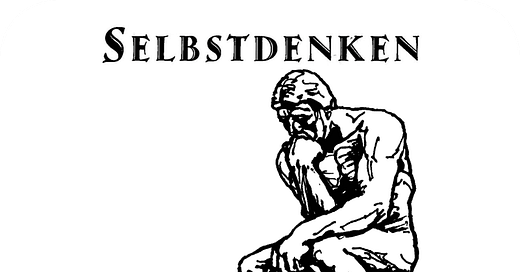Source Documents: German Scan
Note(s): None.
Title: Thinking for Oneself [de: Selbstdenken]
Author(s): The Editor, Friedrich Rasche
“Der Weg” Issue: Year 1, Issue 5 (October 1947)
Page(s): 306-307
Referenced Documents: None.
THINKING FOR ONESELF
The Editor: We draw this significant passage from an essay by F. Rasche, which appeared in the March 1947 issue of Denkendes Volk (Thinking People), published by G. Westermann.
To claim that free, outspoken, and fearless thinking has now taken root everywhere among us would surely be hasty and reckless. Indeed, numerous obstacles stand in its way. The day as we are forced to live it today—ever turned toward outward struggles, steeped in worry and uncertainty—this day, heavy with burden and toil, scarcely grants us a moment for reflection, though reflection is precisely what we need most. Thought demands a quiet hour, a measure of leisure, and such a privilege is likely afforded to only a few in these times.
Yet, for all that, we—each individual and the people as a whole—now possess the freedom to ponder all the questions fate has laid before us. And it is not merely the political questions, however insistently they press, that summon our intellectual striving. Above all, it is the vast questions of existence and essence that demand our clarity and a renewed certainty. More grievously than most have grasped, the spiritual framework of our world, the ethical orders, have been shaken—and not only among us. Thus, we must rebuild not just our houses and cities but the realm of the spirit as well. We must restore humanity, whose image has been so dreadfully defiled. We must bestow new meaning upon life, which has been plunged into the abyss of senselessness. All this can come only through a tremendous effort of thought, and it remains unclear how or by whom this labor will be fulfilled. We are still clawing our way out from the rubble of a shattered spiritual world; we have yet to discern what may be salvaged from the great ruin and what must be cast aside. Only then will we be poised to lay the foundations of something new.
It would be absurd to insist that every single person, without exception, must contribute decisively to this spiritual renewal. True thinkers—those for whom, as Schopenhauer puts it, thinking is as natural as breathing, and in whom great, fertile ideas are born—are rare. What’s more, authentic intellectual resolutions cannot simply be conjured at will; they ripen slowly, often through struggle. Still, if we dare to dream of our people’s inner healing and renewal, it rests fundamentally on each of us. Thus, every eager mind bold enough to think for itself might play a part in shaping a German future marked by freedom. Education in thinking for oneself, rooted in the recognition of each person as a free and accountable being, would be the safeguard against the rise of mass delusion.
But thinking for oneself means this: sparing no effort, whatever the question, to seek the answer on one’s own—not rashly, but by wrestling with the matter steadfastly and deeply.
Thinking for oneself means: without pride, trusting first to one’s own mind. What is gained through one’s own labor is ever worthier to stand upon than the half-grasped cleverness of another, puffed up for show.
Thinking for oneself means: living from the wealth of one’s own intellect, not scavenging now and then, as chance allows, at another’s table.
Thinking for oneself means: speaking the tongue of one’s own thoughts, not echoing the words of the book lying open before you.
Thinking for oneself means: standing and striding on one’s own legs, not leaning on the crutches of opinion that fashion makes cheap and plentiful.
Thinking for oneself means: honoring another’s views when they are hard-won and their own, for the one who thinks independently knows the worth and dignity of a truth self-discovered.
Thinking for oneself means: remaining open to all people and all things. For the independent thinker does not borrow life’s phenomena from second or third hands; he must meet them face to face to pierce their depths. Face to face: without flinching, without averting his gaze, and so with the courage to confront bitter truths.
Thinking for oneself almost always means: swimming against the tide of opinion that sweeps the great throng along.
Thinking for oneself means: stirring the ire of those who choose the lighter path.
Thinking for oneself does not banish error, but it embraces a steady willingness to see it and set it right.
If, then, each person brings order to themselves and holds fast to it—if, pondering the fate of humankind and our purpose on this earth, they cast these thoughts of order outward into the vast and universal—then a greater order might flourish in the whole, one that heralds a brighter tomorrow.
Ich kann freilich nicht sagen, Ob es besser wird, Wenn es anders wird; Aber soviel kann ich sagen, Es muß anders werden, Wenn es besser werden soll.
I can't say if things will get better just through change; But I can say things must change for it to get better.





